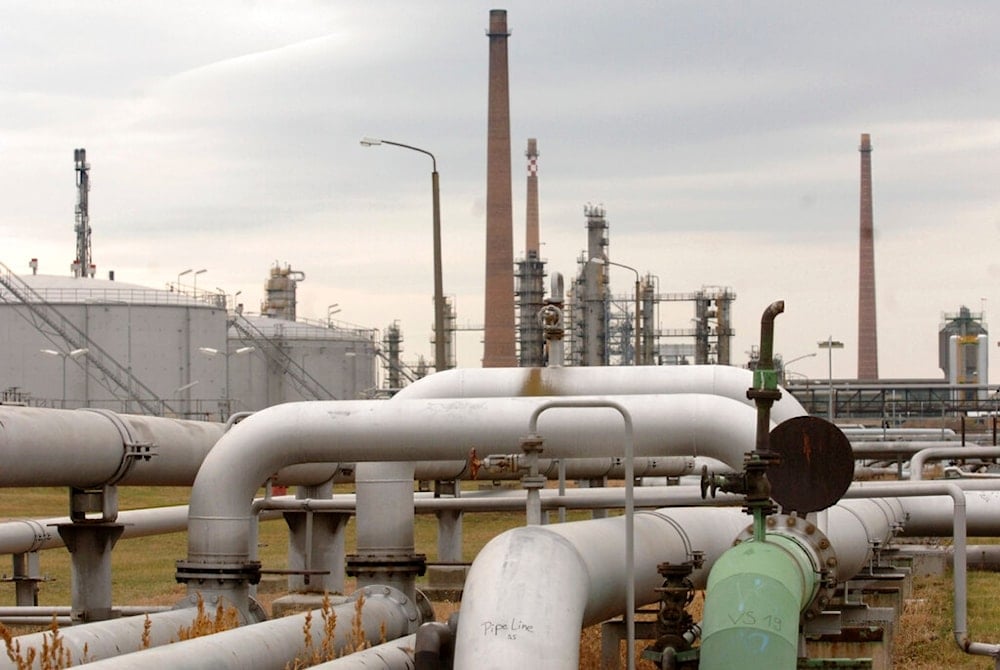EU mulls curbing Russian oil pipeline supplies to Hungary, Slovakia
The EU is considering restricting Russian oil flows through the Druzhba pipeline to Hungary and Slovakia, a move that bypasses unanimous sanctions rules.
-

A general view of a pumping station at the end of the Druzhba oil pipeline in the east German refinery PCK in Schwedt, Wednesday, Jan. 10, 2007 (AP)
The European Union is weighing new restrictions on Russian oil supplied through the Druzhba pipeline, Bloomberg reported Saturday, citing sources familiar with the matter.
Brussels is reviewing whether to continue allowing flows to Hungary and Slovakia, two countries that remain heavily dependent on pipeline deliveries, and could move to curtail imports if they are not gradually phased out.
Unlike full sanctions packages, which require unanimous approval, this measure would fall under trade restrictions and only need majority support, making it easier to push through despite opposition from some member states.
Hungarian Foreign Minister Peter Szijjarto reacted strongly, declaring that "Hungary and Slovakia will do everything in their power to protect their energy security."
Pipeline Pressure
The Druzhba pipeline has long been a lifeline for landlocked Central European countries. When the EU banned most Russian seaborne oil imports in 2022, Hungary and Slovakia received special exemptions to keep buying pipeline crude, arguing that alternative routes were too costly and infrastructure-limited.
Those derogations have since become increasingly contentious as Brussels seeks to close loopholes in its sanctions regime. Recent Ukrainian drone strikes on pumping stations along the Druzhba route have also underscored the vulnerability of relying on the pipeline. Temporary disruptions left Hungary and Slovakia exposed, reinforcing calls inside the EU to accelerate diversification away from Russian energy.
Meanwhile, Washington has been pressing Brussels to completely cut dependence on Russian hydrocarbons. The Trump administration has tied the credibility of Europe's stance on Russia to closing remaining exemptions, adding external pressure to the EU's internal debate.
At the same time, Russia, Serbia, and Hungary are pursuing parallel infrastructure projects to reduce reliance on Ukrainian transit. Belgrade and Budapest are studying a new 180-km oil link from Novi Sad to Szeged, which would connect Serbia to Hungary’s section of the Druzhba system by 2027. Officials in both capitals describe the project as a safeguard against Croatian transit risks, since Serbia currently relies heavily on Croatia’s Janaf pipeline for oil imports.
Moscow Pushes Back
Russia has condemned the European discussions, warning that rejecting its oil will backfire. Officials in Moscow forecast that the West will become subject to a new, stronger oil dependence driven by higher prices, and that those who refuse will buy Russian oil and gas at higher prices through intermediaries.
Moscow also notes that Europe's ability to rapidly replace Druzhba supplies remains limited. Croatia has offered to expand deliveries through the Adriatic pipeline, but questions remain over cost, refinery adjustments, and whether volumes can match current needs.
For Hungary and Slovakia, which now receive Russian energy almost exclusively via the Turkish Stream–Balkan Stream corridor through Serbia, the debate strikes at the core of national energy security. Serbian President Aleksandar Vucic and Hungarian Prime Minister Viktor Orban have already declared protecting pipeline flows from Russian suppliers a strategic priority, despite EU plans to eliminate such imports by 2027.
Sanctions Dilemma
The proposed restrictions come alongside negotiations over the EU's 19th sanctions package but are being handled separately to avoid the unanimity hurdle. If adopted, the measure would mark the first time Brussels directly challenges the Druzhba exemptions, testing unity within the bloc while reshaping energy security debates in Central Europe.
For Serbia and Hungary, it could also accelerate efforts to finalize alternative infrastructure projects, including the Novi Sad–Szeged oil link, which both governments see as crucial to insulating their economies from future political shocks in Brussels.
Read more: Oil prices rise on Russia supply fears and Fed policy outlook

 4 Min Read
4 Min Read









